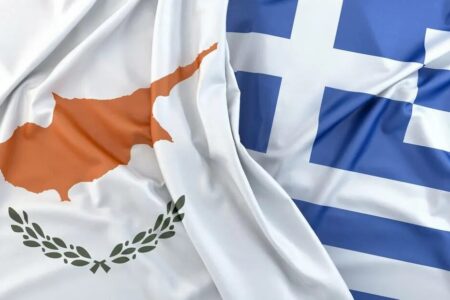Cyprus, located at the crossroads of trade routes between East and West, is not only a cultural and historical intersection but also rich in myths and legends closely intertwined with ancient Greek mythology. This island was the setting for many mythical stories, and its lands hold traces of ancient gods, heroes, and mythical creatures. Let’s delve into some of the most fascinating legends and myths associated with ancient Cyprus.
Contents
Aphrodite — Goddess of Love and Beauty
One of the most famous legends associated with Cyprus is the myth of the birth of Aphrodite. According to ancient Greek mythology, Aphrodite was born from the sea foam off the coast of Cyprus. Her birthplace is located on the island’s western coast, near the modern city of Paphos, and is known as the “Rock of Aphrodite.” This legend made Cyprus a sacred place for the worship of the goddess of love and beauty.

According to the myth, Aphrodite was born after the god Uranus was overthrown by his son Cronus. Cronus threw the severed parts of Uranus into the sea, and from their foam, Aphrodite was born. She emerged from the waters near a rock on the Cypriot coast, still known as Petra tou Romiou. This place attracts thousands of tourists who believe in the magical power of love and beauty associated with this myth.

The ancient Greeks considered Cyprus the main center of Aphrodite’s cult. Temples dedicated to her were located on the island, drawing worshippers from across the ancient world to pay homage to the goddess. In Paphos, a temple was founded where religious ceremonies were held in honor of Aphrodite, and the city was regarded as one of the most sacred places on the island.
Pygmalion and Galatea
Another famous legend of Cyprus is the story of Pygmalion, connected with the ancient city of Paphos. Pygmalion was a sculptor who created an ivory statue of a woman so beautiful that he fell in love with his creation. He named the statue Galatea and prayed daily to the goddess Aphrodite to bring his beloved to life. Impressed by his devotion, Aphrodite granted his wish, and Galatea came to life. This myth of a creator’s love for his creation continues to inspire writers, artists, and philosophers today.
After Galatea came to life, she became Pygmalion’s wife, and they had a son, Paphos, who later founded the city of the same name. Legend has it that Pygmalion built the first temple of Aphrodite as gratitude for fulfilling his dream.
Myths about the Name of Cyprus
The origin of the island’s name, Cyprus, is also shrouded in myths and legends. One popular version is linked to the “Cyprus tree,” which, according to legend, was brought to the island by its first inhabitants. This plant grew in Arabia, Egypt, and Persia and was valued for its medicinal and decorative properties. It is believed that the island’s name came from this tree, symbolizing fertility and prosperity.
Another legend ties the name Cyprus to the goddess Aphrodite, whom Homer in the “Iliad” called Kypris. This epithet was given to the goddess because she was particularly revered on the island. Some myths suggest that Cyprus was named after Kypros, the son of one of the island’s early kings.
The most likely explanation for the name’s origin is related to copper, which was abundant on the island in ancient times. Cyprus became one of the first places where copper was mined and processed, leading to the island’s economic flourishing in antiquity. The Latin word for copper, “cuprum,” gave rise to the island’s modern name.
Kinyras — Legendary King of Cyprus
Cyprus is also associated with the legend of King Kinyras, a powerful ruler of the island. According to myths, Kinyras was the high priest of the temple of Aphrodite and the founder of the ancient city of Paphos. His reign was prosperous, and he was known as a wise and just king.
However, his story also has a tragic side. According to one myth, Kinyras was the father of Myrrha, who, under a curse from Aphrodite, fell in love with her father. This forbidden love resulted in the birth of Adonis, one of the most beautiful men in mythology, who became a favorite of Aphrodite. The legend of Kinyras and Myrrha is one of the most tragic tales in ancient Greek mythology.
Myths of Cypriot Giants and Monsters
Cypriot mythology is not limited to stories of gods and people. The island was also home to many mythical creatures, such as giants and monsters. One such creature was the giant Antaeus, son of Poseidon and Gaia, who, according to legend, lived on Cyprus. Antaeus was invincible as long as he touched the ground, but he was defeated by Heracles, who lifted him into the air, depriving him of his strength.
Cypriot legends also mention monsters such as dragons and serpents guarding hidden treasures and ancient sanctuaries. These creatures often became obstacles for heroes and adventurers seeking wealth or the hearts of beautiful maidens.
Legends of Enchanted Places and Treasures
The island of Cyprus is renowned for its myths about hidden treasures and enchanted places. One such legend tells of underground caves where untold riches are hidden, guarded by spirits and ancient gods. These caves, according to legend, open only once every hundred years, and only the chosen ones can find the path to the treasures.
One of these myths is connected to the Troodos Mountains, where it is said that ancient artifacts and golden statues are hidden. However, the path to these treasures is not only guarded by natural obstacles but also by magical creatures protecting ancient relics.
Myths of Love and Betrayal
Cypriot legends are full of stories of love and betrayal that reflect human passions and emotions. One such story is the myth of King Praxandros and his wife Ariadne. According to legend, Ariadne, tired of her husband’s oppression, fell in love with a young warrior who had been captured by the king. The lovers planned to escape, but their plot was uncovered, and Praxandros ordered both to be executed. This story became a symbol of passionate and tragic love, still told in local folklore.

The legends and myths of Cyprus are not only a part of its history but also a cultural heritage passed down through generations. These stories help us understand how the island’s ancient inhabitants viewed the world, gods, and human relationships. Cypriot mythology is deeply connected to its nature, culture, and history, continuing to inspire modern people as they seek answers to timeless questions of love, power, and destiny.
















